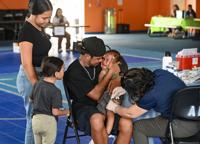Health
Guam Summit Addresses Urgent Mental Health Crisis and Homelessness

The state of mental health on Guam took center stage at the Guam Homeless Coalition’s 4th Housing and Homelessness Summit, held at the University of Guam. The summit highlighted the urgent need for improved mental health resources on the island, particularly following the implementation of the 988 Lifeline in 2022, which has seen over 30,000 crisis interactions. Project coordinator Jesse Libby reported that one in every five residents is likely to experience a mental health crisis at some point in their lives.
“Guam statistically has high rates of suicide, and this issue disproportionately affects our community,” Libby stated. He emphasized that while the demand for mental health services is significant, the available resources remain severely limited. “It’s hard to refer someone who needs a bed to go where there are no more beds left at shelters,” he added.
Link Between Mental Health and Homelessness
The summit’s theme, “Navigating homelessness and services amid shifting policy currents,” underscored the intersection of mental health crises and homelessness in Guam. According to Mark Torre Jr., supervisor of the Mobile Crisis Response Team (MCRT) under the Guam Behavioral Health and Wellness Center, a substantial portion of the homeless population utilizes the 988 Lifeline. Torre explained that the MCRT aims to reduce reliance on police intervention during mental health crises.
“Typically, when someone is in a crisis, they call 911. While that’s not wrong, there’s now another option: 988,” he said. The MCRT provides mental health specialists instead of law enforcement, which can prevent individuals from being caught in the judicial system.
Despite the high volume of calls, MCRT operations have shifted from a 24-hour service to operating from 07:00 to 23:30 daily starting September 1, 2025. Torre noted that this change reflects demand patterns, with most calls occurring during regular working hours. “We have the blueprint to revert to 24-hour services if community needs escalate,” he affirmed.
Currently, MCRT operates with two eight-hour shifts, staffed by two to four team members per shift. Torre reported that approximately 75% of MCRT activations effectively de-escalated situations without necessitating additional agency involvement. Of the cases handled, 62% were related to mental health crises, with 34% involving suicidal or homicidal thoughts. A significant factor was medication non-compliance, accounting for 30% of the interventions. Notably, 51% of the cases were stabilized at the callers’ homes, preserving family units.
Service Gaps and Future Directions
The summit also addressed critical gaps in mental health services. Dr. Carla T. Haddock of the Guam Behavioral Health and Wellness Center highlighted the absence of dementia centers on the island, which could provide essential support for individuals with Alzheimer’s disease and other dementia-related conditions. “That is really, truly a gap in service on this island,” she remarked.
Haddock also discussed the voluntary and involuntary admissions process for those in crisis, noting a recent legislative initiative by Sen. Shelly Calvo, Bill 219-38, aimed at modifying and expanding requirements for Assisted Outpatient Treatment.
Alyssa Roberto, project director for Guam Systems of Care, emphasized the importance of outreach in addressing mental health needs. She explained that lead providers meet individuals in familiar locations and assist with transportation using bus passes. The Guam Systems of Care operates continuously, with three eight-hour shifts and two to three intake workers available during business hours.
The summit served as a critical platform for stakeholders to discuss the pressing mental health issues facing Guam. The conversations and proposed solutions aim to foster a more comprehensive support system for those experiencing mental health crises, particularly among the homeless population. As the community continues to navigate these challenges, the hope is for a collaborative effort to enhance mental health services and ultimately save lives.
-

 Lifestyle4 months ago
Lifestyle4 months agoLibraries Challenge Rising E-Book Costs Amid Growing Demand
-

 Sports4 months ago
Sports4 months agoTyreek Hill Responds to Tua Tagovailoa’s Comments on Team Dynamics
-

 Sports4 months ago
Sports4 months agoLiverpool Secures Agreement to Sign Young Striker Will Wright
-

 Lifestyle4 months ago
Lifestyle4 months agoSave Your Split Tomatoes: Expert Tips for Gardeners
-

 Lifestyle4 months ago
Lifestyle4 months agoPrincess Beatrice’s Daughter Athena Joins Siblings at London Parade
-

 World4 months ago
World4 months agoWinter Storms Lash New South Wales with Snow, Flood Risks
-

 Science4 months ago
Science4 months agoTrump Administration Moves to Repeal Key Climate Regulation
-

 Science3 months ago
Science3 months agoSan Francisco Hosts Unique Contest to Identify “Performative Males”
-

 Business4 months ago
Business4 months agoSoFi Technologies Shares Slip 2% Following Insider Stock Sale
-

 Science4 months ago
Science4 months agoNew Tool Reveals Link Between Horse Coat Condition and Parasites
-

 Sports4 months ago
Sports4 months agoElon Musk Sculpture Travels From Utah to Yosemite National Park
-

 Science4 months ago
Science4 months agoNew Study Confirms Humans Transported Stonehenge Bluestones









